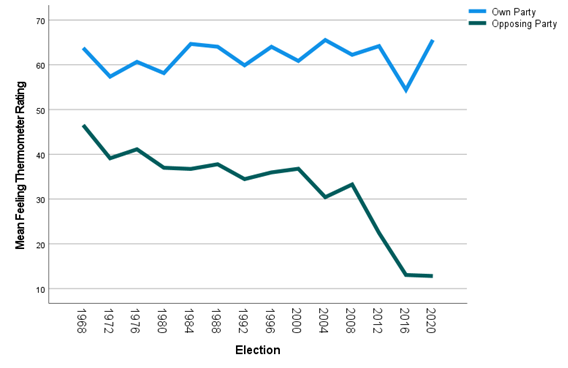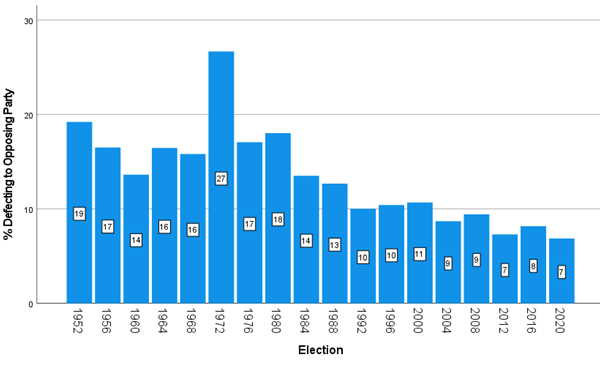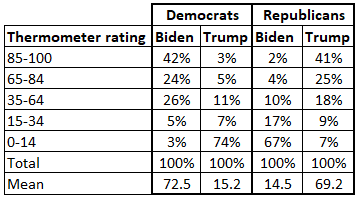KEY POINTS FROM THIS ARTICLE
— Negative partisanship — the tendency for partisans to be animated by dislike for the other side — has become a powerful force in American politics.
— This dynamic makes it harder for partisans to cross over to the other side and keeps general elections quite competitive.
— Attacks on Donald Trump by Democrats, liberals, and mainstream media figures and even indictments by federal and state prosecutors on serious criminal charges have only served to reinforce the loyalty of Republican voters to Trump.
Negative partisanship buoys Trump
Less than six months before voters begin casting ballots in the first presidential caucuses and primaries, former President Donald Trump continues to dominate the field of Republican candidates. According to RealClearPolitics as of Aug. 22, Trump is receiving an average of 55.9% support in national polls of Republican voters compared with 14.6% for his nearest rival, Florida Gov. Ron DeSantis. Moreover, Trump’s margin over DeSantis has increased in recent months following indictments in multiple jurisdictions for allegedly criminal conduct including his notorious efforts to overturn the results of the 2020 presidential election.
What is perhaps even more surprising than Trump’s domination of the Republican nomination contest is his continued competitiveness in a potential general election matchup with President Biden. Despite all of the criminal charges filed against him, Trump remains locked in a near dead heat with Biden, receiving an average of 43.7% of the vote compared with 44.2% for Biden according to the most recent RealClearPolitics polling average.
Donald Trump’s competitiveness in a general election matchup with Joe Biden is due mainly to intense loyalty from Republican voters. In a recent New York Times/Siena national poll that had Biden and Trump tied with 43% of the vote, only 7% of Republicans, including leaning independents, preferred Biden to Trump. Among respondents who reported voting for Trump in 2020, the former president led Biden 91%-2%. Given the close divide in the country between supporters of the two major parties, this sort of loyalty among Republican voters is what is keeping the 2024 presidential general election highly competitive.
Negative partisanship
In this article, I argue that the key to understanding both Donald Trump’s domination of the Republican nomination contest and his continued competitiveness in a general election matchup with Joe Biden is negative partisanship. Negative partisanship refers to the growing dislike of the opposing party and its leaders among voters who identify with or lean toward one of the two major parties in the U.S. This trend is very apparent in Figure 1, which displays the average ratings of the presidential candidate from a voter’s own party and from the opposing party on the 0-100 degree feeling thermometer scale in surveys conducted by the American National Election Studies between 1968 (the first survey to include the feeling thermometer scale) and 2020.
Figure 1: Mean feeling thermometer ratings of own party and opposing party presidential candidates, 1968-2020

Source: ANES Cumulative File
The data in Figure 1 shows that while ratings of the presidential candidate from one’s own party have remained fairly stable over this time period, ratings of the opposing party’s presidential candidate have fallen considerably, especially since 2008. In both 2016 and 2020, supporters of both major parties, including independents leaning towards a party, gave the opposing party’s candidate an average rating of just above 10 degrees compared with average ratings of close to 40 degrees between 1968 and 1976. In 2016, 57% of partisans gave the opposing party’s presidential candidate a rating of zero, the lowest rating possible on the scale. In 2020, 63% of partisans gave the opposing party’s candidate a rating of zero.
Figure 2: Percentage of partisans defecting in presidential elections, 1952-2020

Note: Based on major party voters
Source: American National Election Studies Cumulative File
One of the most important consequences of negative partisanship is that crossing party lines to support a candidate from the opposing party has become totally unacceptable to the large majority of partisans. As a result, defection rates by partisans have declined dramatically in all types of elections, and especially in presidential elections. This can be seen in Figure 2, which displays the rate of defection by partisans, including leaning independents, in presidential elections between 1952 and 2020. Whereas, defection rates generally ranged between 15- 20% between 1952 and 1980, they have been consistently below 10% since 2000. The three most recent elections have seen the lowest defection rates in the past 70 years. Even among partisans who have reservations about their own party’s candidate, as was true for many Democrats and Republicans in 2016, the opposing party’s candidate is generally seen as far worse.
2024 candidate preference
In order to examine Republican loyalty to Donald Trump in the run-up to the 2024 presidential election, I analyzed data from the 2022 Pilot Study conducted by the American National Election Studies. This was an online survey conducted by YouGov in November 2022 based on an opt-in sample designed to represent the voting-age population of the United States. In addition to questions about respondents’ political attitudes and voting behavior in the 2022 midterm election, the survey included an extensive battery of questions about a possible 2024 rematch between Joe Biden and Donald Trump.
Table 1: Feeling thermometer ratings of Biden and Trump by Democrats and Republicans in 2022

Source: ANES 2022 Pilot Study
Table 1 displays the distribution of feeling thermometer ratings of Joe Biden and Donald Trump by Democratic and Republican identifiers, including leaning independents, in the ANES Pilot Study. The data in this table show that among supporters of both parties, negative feelings toward the opposing party’s leader were much more intense than positive feelings toward their own party’s leader. Only 42% of Democrats gave Joe Biden a rating of 85 degrees or higher on the feeling thermometer scale but 74% gave Donald Trump a rating of less than 15 degrees. Similarly, only 41% of Republicans gave Donald Trump a rating of 85 degrees or higher but 67% gave Joe Biden a rating of less than 15 degrees.
There is one interesting difference between the ratings given by Democrats and Republicans to their own party’s leader: 16% of Republicans rated Donald Trump below 35 degrees while only 8% of Democrats rated Joe Biden below 35 degrees. These numbers suggest that a somewhat larger share of Republicans than Democrats had serious reservations about the frontrunner for their party’s 2024 presidential nomination.
Table 2: 2024 presidential vote preference by party identification

Source: 2022 ANES Pilot Study
Respondents in the 2022 ANES Pilot Study were asked directly about their candidate preference in a potential rematch between Joe Biden and Donald Trump in 2024. The results are displayed in Table 2. The most striking finding in this table is that very few supporters of either party stated a preference for the opposing party’s nominee. Only 7% of Democrats indicated that they would vote for Donald Trump over Joe Biden and only 4% of Republicans indicated that they would vote for Biden over Trump. However, a larger minority of voters in each party — 19% of Republicans and 13% of Democrats — indicated that they would vote for “someone else” if given a choice between Biden and Trump.
The fact that large numbers of Democrats and Republicans stated a preference for someone other than Biden or Trump in a 2024 rematch between the two candidates undoubtedly reflects the fact that a substantial minority of Democrats and an even larger minority of Republicans had serious reservations about their party’s likely presidential candidate. However, a stated preference for an unnamed alternative candidate does not necessarily mean that these disgruntled Democrats and Republicans are likely to end up voting for an actual third party or independent candidate with little or no chance of winning the election. Nor does this preference for “someone else” necessarily mean that these voters would actually defect to the opposing party’s candidate in a one-on-one matchup. In fact, evidence from the 2022 ANES Pilot Study suggests that the large majority of those preferring “someone else” would end up backing their own party’s nominee.
Table 3: Relative feeling thermometer ratings of Trump and Biden by Democrats and Republicans preferring someone else for president

Source: 2022 ANES Pilot Study
Table 3 displays relative feeling thermometer ratings of Biden and Trump among Democrats and Republicans who stated a preference for “someone else” in a rematch of the 2020 candidates. Relative feeling thermometer ratings are a very strong predictor of candidate preference — over 90% of voters typically choose the candidate whom they rate more favorably. The results in Table 3 show that the vast majority of those stating a preference for “someone else” would be likely to end up voting for their own party’s candidate: 68% of Republicans rated Donald Trump more favorably than Joe Biden and 80% of Democrats rated Joe Biden more favorably than Donald Trump. Thus, even among the minority of Democrats and Republicans who preferred “someone else” in a rematch between Biden and Trump, relatively few actually rated the opposing party’s candidate more favorably than their own party’s candidate.
Conclusion
Negative partisanship is the key to understanding the continuing loyalty of Republican voters to former President Donald Trump. Attacks on Trump by Democrats, liberals, and mainstream media figures and even indictments by federal and state prosecutors on serious criminal charges have only served to reinforce the loyalty of Republican voters to Trump. Republican voters see these attacks and indictments as efforts by the hated opposition party and its allies to weaken the former president and prevent his return to the White House. Similarly, in a general election matchup between Joe Biden and Donald Trump, even Republicans who have reservations about Trump overwhelmingly prefer him to Biden because they believe the portrayal of Biden by Republican leaders and conservative media outlets as a radical leftist and a threat to the survival of the nation. As a result, it appears likely that a rematch between Biden and Trump in 2024 will remain highly competitive with the outcome hinging on a small number of swing voters in a handful of closely contested states — an outcome that could lend itself to attacks on the integrity of the election by the former president and his allies.
 Alan I. Abramowitz is the Alben W. Barkley Professor of Political Science at Emory University and a senior columnist with Sabato’s Crystal Ball. His latest book, The Great Alignment: Race, Party Transformation, and the Rise of Donald Trump, was released in 2018 by Yale University Press. Alan I. Abramowitz is the Alben W. Barkley Professor of Political Science at Emory University and a senior columnist with Sabato’s Crystal Ball. His latest book, The Great Alignment: Race, Party Transformation, and the Rise of Donald Trump, was released in 2018 by Yale University Press. |
